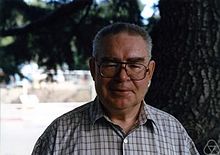| This biography of a living person needs additional citations for verification. Please help by adding reliable sources. Contentious material about living persons that is unsourced or poorly sourced must be removed immediately from the article and its talk page, especially if potentially libelous. Find sources: "Alexandre Kirillov" – news · newspapers · books · scholar · JSTOR (April 2012) (Learn how and when to remove this message) |
| Alexander Kirillov | |
|---|---|
 | |
| Born | (1936-05-09) May 9, 1936 (age 88) Moscow, Soviet Union |
| Nationality | Russian |
| Alma mater | Moscow State University |
| Known for | Kirillov character formula Kirillov orbit theory Kirillov model |
| Scientific career | |
| Fields | Mathematics |
| Institutions | University of Pennsylvania Moscow State University |
| Thesis | Unitary representations of nilpotent Lie groups (1962) |
| Doctoral advisor | Israel Gelfand |
| Doctoral students | Alexei Borodin Victor Ginzburg David Kazhdan Alexander Molev Andrei Okounkov Andrei Zelevinsky |
Alexandre Aleksandrovich Kirilloff (Russian: Алекса́ндр Алекса́ндрович Кири́ллов, born 1936) is a Soviet and Russian mathematician, known for his works in the fields of representation theory, topological groups and Lie groups. In particular he introduced the orbit method into representation theory. He is an emeritus professor at the University of Pennsylvania.
Career
Kirillov studied at Moscow State University where he was a student of Israel Gelfand. His Ph.D. (kandidat) dissertation Unitary representations of nilpotent Lie groups was published in 1962. He was awarded the degree of Doctor of Science. At the time he was the youngest Doctor of Science in the Soviet Union. He worked at the Moscow State University until 1994 when he became the Francis J. Carey Professor of Mathematics at the University of Pennsylvania.
During his school years, Kirillov was a winner of many mathematics competitions, and he is still an active organizer of Russian mathematical contests. Kirillov is an author of many popular school-oriented books and articles.
In 2012 he became a fellow of the American Mathematical Society.
Kirillov's son, Alexander Kirillov, Jr., is also a mathematician, working on the representation theory of Lie groups at the State University of New York at Stony Brook.
Publications
- Kirillov, A. A. (1976) , Elements of the theory of representations, Grundlehren der Mathematischen Wissenschaften, vol. 220, Berlin, New York: Springer-Verlag, ISBN 978-0-387-07476-4, MR 0412321
- ——— (1999). "Merits and demerits of the orbit method". Bull. Amer. Math. Soc. (N.S.). 36 (4): 433–483. doi:10.1090/s0273-0979-99-00849-6. MR 1701415.
- ——— (2004), Lectures on the orbit method, Graduate Studies in Mathematics, vol. 64, Providence, RI: American Mathematical Society, ISBN 0-8218-3530-0.
References
- Marathe, Kishore (2010-08-18). Topics in Physical Mathematics. Springer. pp. 420–. ISBN 9781848829381. Retrieved 10 August 2012.
- Huang, Jing-Song (1999). Lectures on Representation Theory. World Scientific. pp. 163–. ISBN 9789810237257. Retrieved 10 August 2012.
- List of Fellows of the American Mathematical Society, retrieved 2013-01-27.
- Vogan Jr, David A. (2005). "Review: Lectures on the orbit method, by A. A. Kirillov". Bull. Amer. Math. Soc. (N.S.). 42 (4): 535–544. doi:10.1090/s0273-0979-05-01065-7.
External links
- Home page of Alexandre Kirillov
- O'Connor, John J.; Robertson, Edmund F., "Alexandre Kirillov", MacTutor History of Mathematics Archive, University of St Andrews
- Alexandre Kirillov at the Mathematics Genealogy Project
This article about a Russian mathematician is a stub. You can help Misplaced Pages by expanding it. |
- Soviet mathematicians
- 20th-century Russian mathematicians
- 21st-century Russian mathematicians
- Group theorists
- Russian emigrants to the United States
- 1936 births
- Living people
- Moscow State University alumni
- University of Pennsylvania faculty
- Mathematicians at the University of Pennsylvania
- Fellows of the American Mathematical Society
- Russian mathematician stubs